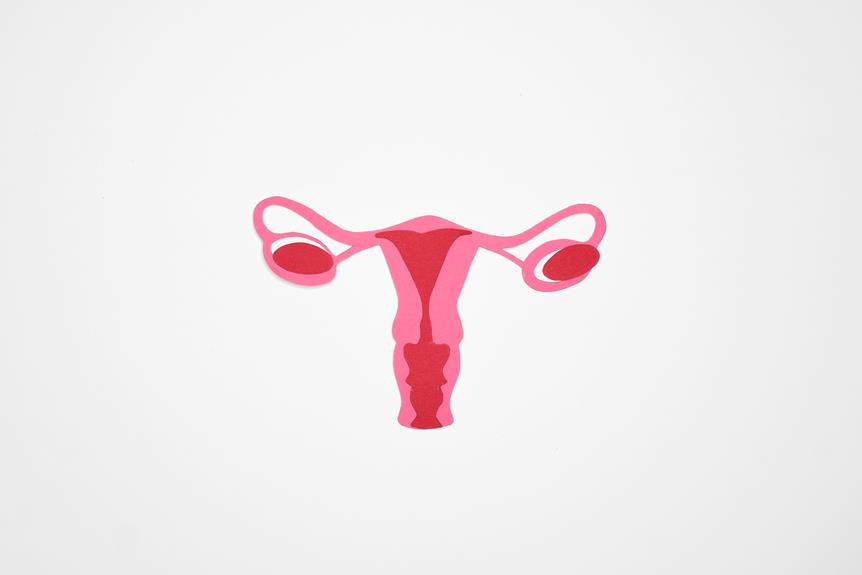What Is Ovarian Health and How to Detect Early Warning Signs

In the delicate symphony of reproductive health, the ovaries play a crucial role as the maestros of hormonal balance. Like the proverbial canaries in the coal mine, early warning signs of ovarian issues can serve as vital indicators of potential health concerns.
This article explores the significance of ovarian health, delving into the function of these remarkable organs and the common symptoms that may warrant attention. Additionally, it sheds light on diagnostic tests, screening methods, and proactive steps one can take to safeguard their ovarian well-being.
Key Takeaways
- Ovarian health plays a crucial role in overall well-being and reproductive capabilities, including fertility and healthy pregnancy.
- Regular check-ups and screenings are essential for maintaining ovarian health and empowering women to make informed decisions about their fertility options.
- Early detection of ovarian health issues through reliable screening methods is important for successful treatment and reduced complications.
- Lifestyle factors such as regular exercise, a balanced diet, and improved blood flow to reproductive organs contribute to maintaining ovarian health.
The Importance of Ovarian Health
The importance of ovarian health cannot be overstated, as it plays a crucial role in a woman's overall well-being and reproductive capabilities.
Ovarian health awareness is essential in promoting fertility and ensuring a woman's ability to conceive and carry a healthy pregnancy.
By understanding the factors that contribute to optimal ovarian health, women can take proactive steps to maintain it. Regular check-ups, healthy lifestyle choices, and awareness of common warning signs are key in detecting any potential issues early on.
By promoting awareness about ovarian health and encouraging regular screenings, we can empower women to take control of their reproductive health and make informed decisions about their fertility options.
Understanding ovarian function and hormonal balance is the next step in this journey towards ensuring overall well-being and reproductive success.
Understanding Ovarian Function and Hormonal Balance
In order to fully comprehend the complexities of ovarian function and hormonal balance, it is imperative to delve into the intricate mechanisms that govern these processes. Ovarian function refers to the ability of the ovaries to produce and release eggs, as well as the production of hormones such as estrogen and progesterone. Hormonal balance, on the other hand, is crucial for maintaining overall health and well-being.
To highlight the significance of understanding ovarian function and hormonal balance, consider the following points:
- Ovarian function plays a key role in fertility and reproductive health.
- Hormonal balance affects various aspects of a woman's health, including her menstrual cycle, mood, and bone density.
- Imbalances in ovarian function and hormonal levels can lead to conditions such as polycystic ovary syndrome (PCOS) or hormonal disorders.
Common Symptoms and Early Warning Signs of Ovarian Issues
Detecting ovarian issues early is crucial for effective treatment and improved outcomes. Common symptoms and early warning signs of ovarian issues include:
- Abdominal or pelvic pain
- Bloating
- Changes in bowel habits
- Frequent urination
- Unexplained weight loss or gain
It is important to be aware of these symptoms and seek medical attention promptly to ensure early detection and appropriate management of ovarian issues, including the potential for silent ovarian cancer symptoms.
Silent Ovarian Cancer Symptoms
I experienced firsthand the silent ovarian cancer symptoms, which made me realize the importance of understanding the early warning signs of this disease. Ovarian cancer is often referred to as a silent killer because its symptoms are often vague and easily mistaken for other conditions. This highlights the need for increased awareness and education about the signs of ovarian cancer. Early detection plays a crucial role in improving the chances of successful treatment and survival.
To emphasize this point, consider the following sub-lists:
- Common silent ovarian cancer symptoms:
- Persistent bloating or feeling of fullness
- Pelvic or abdominal pain
- Changes in bowel habits, such as constipation or diarrhea
- Importance of regular check-ups and screenings:
- Annual pelvic exams
- Transvaginal ultrasound
- CA-125 blood test
- Promoting ovarian health maintenance:
- Healthy diet rich in fruits and vegetables
- Regular exercise
- Minimizing exposure to environmental toxins
Detecting Ovarian Issues?
Several common symptoms and early warning signs can help detect ovarian issues, such as persistent bloating, pelvic pain, and changes in bowel habits.
Ovarian health awareness is crucial for preventing ovarian issues and promoting overall well-being. By understanding the signs and symptoms, individuals can take proactive steps to protect their ovarian health. Regular check-ups with healthcare professionals, including gynecologists, can aid in early detection and prevention of ovarian issues.
Additionally, maintaining a healthy lifestyle, including a balanced diet and regular exercise, can contribute to optimal ovarian health. It is essential for individuals to be aware of the risk factors associated with ovarian issues, such as a family history of ovarian cancer or genetic mutations.
Diagnostic Tests and Screening Methods for Ovarian Health
When it comes to maintaining ovarian health, it is crucial to have access to reliable diagnostic tests and screening methods. These tools can help in the early detection of any potential issues, allowing for prompt intervention and treatment.
Reliable Diagnostic Tests
One of the key factors in assessing ovarian health is the availability of reliable diagnostic tests for early detection. Reliable screening methods are crucial in ensuring effective detection of any potential issues or abnormalities in the ovaries. With accurate and dependable diagnostic tests, healthcare professionals can identify any signs of ovarian dysfunction or disease at an early stage, allowing for timely intervention and treatment.
To emphasize the importance of reliable diagnostic tests, consider the following sub-lists:
- Benefits of reliable screening:
- Enables early detection of ovarian health issues.
- Increases the chances of successful treatment and recovery.
- Reduces the risk of complications and long-term health consequences.
- Characteristics of effective detection methods:
- High accuracy and precision in identifying ovarian abnormalities.
- Sensitivity to detect even minor changes in ovarian health.
- Specificity to differentiate between normal and abnormal ovarian conditions.
Early Detection Techniques
Utilizing innovative diagnostic tests and screening methods, healthcare professionals can improve the early detection of ovarian health issues, ensuring prompt intervention and treatment. Ovarian health awareness and preventive measures are vital in maintaining women's reproductive health. Ovarian health issues, such as ovarian cysts, polycystic ovary syndrome (PCOS), and ovarian cancer, can have significant implications on a woman's well-being. Early detection plays a crucial role in managing these conditions effectively.
To raise ovarian health awareness, healthcare professionals can educate women about the importance of regular check-ups and screenings. By encouraging routine pelvic examinations, ultrasound scans, and blood tests, healthcare providers can detect any abnormalities early on. These tests can identify ovarian cysts, monitor hormonal imbalances associated with PCOS, and detect early signs of ovarian cancer.
Implementing preventive measures is equally important. Lifestyle modifications, such as maintaining a healthy weight, engaging in regular physical activity, and following a balanced diet, can help reduce the risk of ovarian health issues. Additionally, healthcare professionals can discuss contraceptive options that may provide protective benefits against certain ovarian conditions.
Screening for Ovarian Health
The effectiveness of diagnostic tests and screening methods for maintaining women's ovarian health can be enhanced through healthcare professionals' understanding of the latest advancements. Ovarian health screening plays a crucial role in the early detection of potential issues, allowing for timely intervention and improved outcomes.
Here are three key benefits of early detection:
- Increased survival rates: Early detection of ovarian cancer significantly improves the chances of successful treatment and long-term survival. Regular screening helps identify any abnormalities or warning signs at an early stage, enabling healthcare professionals to provide appropriate care promptly.
- Minimized treatment invasiveness: Detecting ovarian health issues early often allows for less invasive treatment options. Early intervention can prevent the need for extensive surgeries or aggressive treatment methods, resulting in a better quality of life for patients.
- Improved disease management: Early detection enables healthcare professionals to implement effective disease management strategies promptly. This may include targeted therapies, personalized treatment plans, and ongoing monitoring to ensure optimal ovarian health.
Lifestyle Factors That Impact Ovarian Health
Regular exercise and a balanced diet significantly contribute to maintaining optimal ovarian health. Preventing ovarian issues and promoting ovarian wellness should be a priority for individuals seeking to serve others.
Engaging in regular physical activity, such as walking or swimming, helps to improve blood flow to the reproductive organs and reduce the risk of ovarian conditions. A balanced diet rich in fruits, vegetables, whole grains, and lean proteins provides essential nutrients that support ovarian health. Additionally, maintaining a healthy weight is crucial, as obesity has been linked to an increased risk of ovarian disorders.
It is important to note that while a healthy lifestyle can help prevent ovarian issues, it is not a guarantee. Therefore, seeking early intervention and treatment for ovarian conditions is essential for timely management and improved outcomes.
Transitioning into the next section, we will explore the importance of detecting early warning signs of ovarian health problems.
Seeking Early Intervention and Treatment for Ovarian Conditions
To ensure timely management and improved outcomes, individuals should prioritize seeking early intervention for and treatment of ovarian conditions through proactive monitoring and prompt medical intervention. Ovarian conditions can range from benign cysts to more serious issues such as ovarian cancer. Seeking medical advice at the first sign of symptoms or abnormalities can greatly increase the chances of successful treatment and recovery.
When it comes to addressing ovarian conditions, holistic approaches can also play a crucial role in supporting overall well-being. Some key points to consider include:
- Adopting a healthy lifestyle: Maintaining a balanced diet, regular exercise, and managing stress levels can contribute to better ovarian health.
- Regular check-ups and screenings: Regular visits to healthcare professionals can help in early detection and prevention of ovarian conditions.
- Exploring complementary therapies: Integrating complementary therapies such as acupuncture or herbal remedies can provide additional support in managing ovarian conditions.
Frequently Asked Questions
Can Ovarian Health Issues Lead to Infertility?
Ovarian health issues can potentially lead to infertility. Factors such as hormonal imbalances, ovarian cysts, and conditions like polycystic ovary syndrome (PCOS) can affect a woman's ability to conceive. Diet and lifestyle choices can also impact ovarian health and fertility.
Are There Any Natural Remedies or Lifestyle Changes That Can Improve Ovarian Health?
Improving ovarian health can be achieved through natural remedies and lifestyle changes. By incorporating healthy habits such as regular exercise, balanced diet, stress reduction, and avoiding environmental toxins, one can enhance their ovarian function and overall well-being.
What Are the Risk Factors for Developing Ovarian Cancer?
Ovarian cancer risk factors include age, family history, inherited gene mutations, hormonal factors, and certain medical conditions. Understanding the impact of ovarian health on fertility is crucial in identifying early warning signs and seeking appropriate medical intervention.
Is There a Link Between Hormonal Birth Control and Ovarian Health?
Hormonal birth control has been the subject of research regarding its impact on ovarian health. Studies have explored the potential link between hormonal birth control and ovarian cancer risks, as well as its influence on fertility.
How Often Should Women Undergo Screening Tests for Ovarian Health?
The frequency of screening tests for ovarian health depends on various factors, such as age, family history, and personal risk factors. Early detection of ovarian health issues through regular screening tests can significantly improve outcomes and increase the chances of successful treatment.








